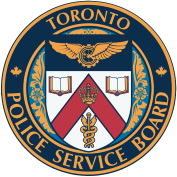
Board Members: Communication and Information-Sharing
|
DATE APPROVED |
March 13, 2014 |
Minute No: P41/14 |
|
DATE(S) AMENDED |
|
|
|
DATE REVIEWED |
October 15, 2012 |
Minute No: C319/12 |
|
REPORTING REQUIREMENT |
|
|
|
LEGISLATION |
Police Services Act, R.S.O. 1990, c.P.15, as amended, s. 31(1)(c). Members of Police Services Boards – Code of Conduct, O. Reg. 421/97. |
|
|
DERIVATION |
Independent Civilian Review into Matters Relating to the G20 Summit, Recommendation No. 17 |
|
Board Members, which is defined as all Board Members, including the Chair and the Vice Chair, receive information from the Chief of Police through a variety of mechanisms, including through formal reports at Board meetings. However, a substantial amount of communication occurs between individual Members of the Board and the Chief or other members of the Command through a number of informal methods, including impromptu meetings or discussions, ad hoc oral briefings at Board meetings, memoranda, telephone calls, or e-mails.
It is critical that any material information obtained by one Board Member that, in his or her judgment, is pertinent to the Board’s consideration of matters before it, or likely to come before it, or that is related to a prior Board decision, or that is of public interest, is shared with the entire Board at the next available opportunity, so that the entire Board can discharge its governance and oversight responsibilities based on the same information.
It is, therefore, the policy of the Toronto Police Services Board that:
- A Board Member will share, at the earliest opportunity, material information that he or she receives through informal communication with the Chief or other members of the Command, that, in his or her judgment, is pertinent to the Board’s consideration of matters before it, or likely to come before it, or that is related to a prior Board decision, or that is of public interest;
- Such communication and information-sharing will be in the form of a formal Board report or briefing at the Board meeting following the receipt of such information;
- Where the information received is, in the Board Member’s judgment, related to an item of an urgent nature and should be considered before the date of the next regularly scheduled Board meeting, the Board Member in receipt of the information will consult with the Chair to determine whether a Special Board meeting should be called or the information can be provided to the full Board by some other means; and
- When the Board becomes aware that, in exercising his or her judgment, a Board Member did not communicate information that ought to have been provided to the full Board, the Board will determine what the appropriate course of action should be, pursuant to Ontario Regulation 421/97, Members of Police Services Boards – Code of Conduct.
board-command interaction, G20-report, command, professional conduct, board administration